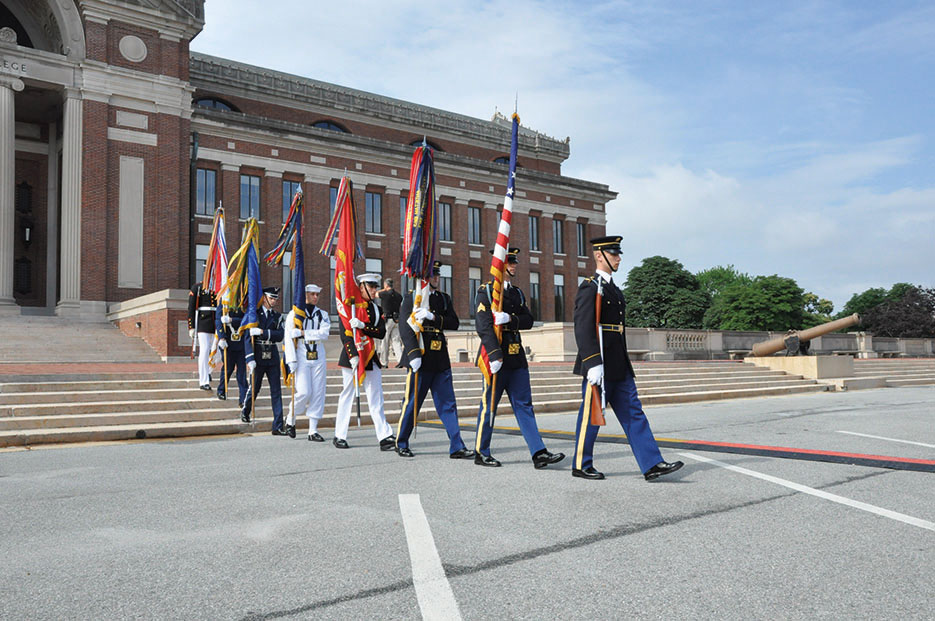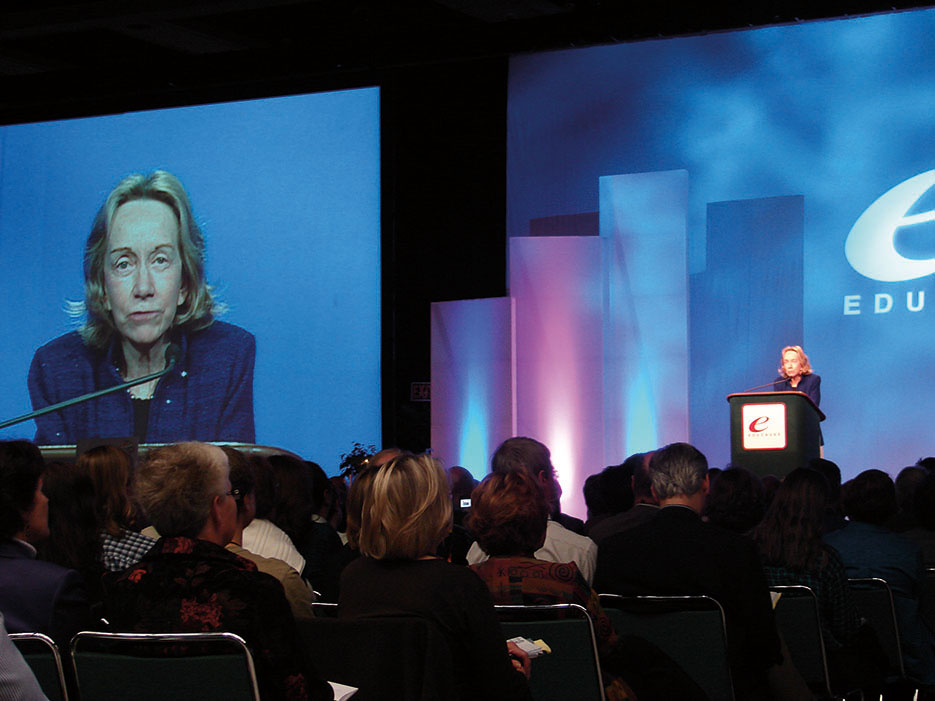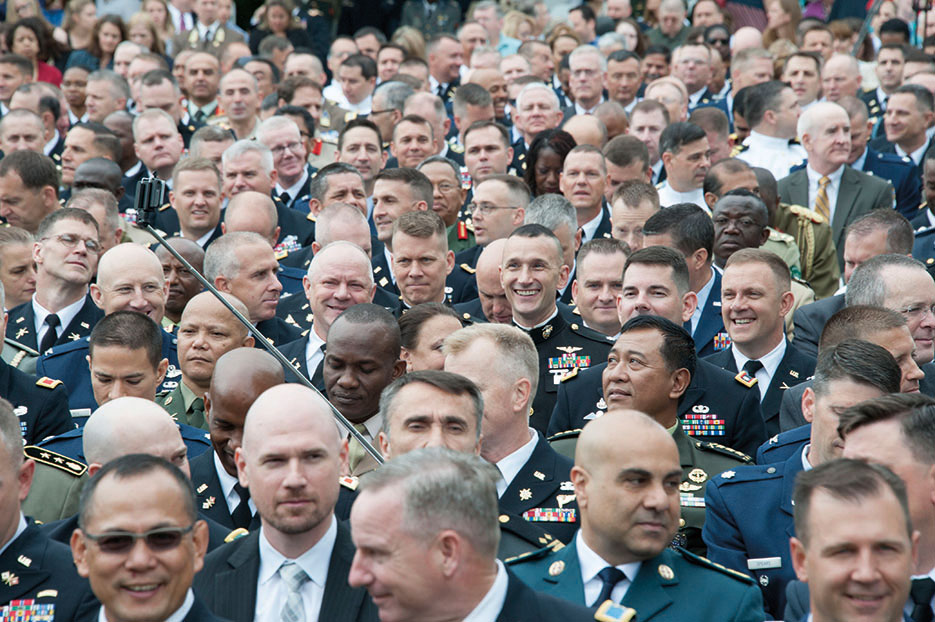Журнальный клуб Интелрос » Joint Force Quarterly » №79, 2015
Advanced professional military education (PME) affords senior officers the opportunity to acquire solid intellectual footing and enter the strategic dialogue following over 20 years of progressively more responsible leadership. With that opportunity, however, comes a responsibility new to many career officers: engaging in ethical professional scholarship. The zenith of PME is transitional. Selected senior military officers are invited, indeed encouraged, to become “warrior-scholars”—individuals who recognize and understand strategic issues, have the intellectual skills to chart a path forward, and have mastered the professional competencies to make it happen.1

National Defense University’s 2015 graduation took place on June 18 at historic Fort Lesley J. McNair in Washington, DC (NDU/Katie Lewis)
The mission is both educational and knowledge generative. Effective execution requires development of critical thinking and writing skills well beyond the norm in military culture. Throughout the military, “officers headed for high rank need to be challenged intellectually and to sharpen their skills in critical, precise, rigorous, and imaginative thinking and writing.”2 At the highest levels, the tasks shift from artfully executing campaigns and missions crafted by others to identifying strategic challenges, rendering assessments, and advocating well-reasoned options to the most senior military and civilian leadership. No longer is the requirement simply to understand what is being done, why, and how to do it; the new goal is to merge professional experience, critical thinking competencies, and acute insights to identify what could or should be done while advancing thoughtful analyses and perceptive recommendations supported by reason and evidence. Most officers arrive at senior Service colleges (SSCs) with considerable experience writing memoranda, operation orders, policy letters, point papers, and the like, but their written documents have been little more than tools for getting the job done effectively and efficiently.3 Customarily, Army documents are written at a reading level halfway between that appropriate for a 12th-grade reader and a college graduate.4 A well-honed mentality and skill set primed almost exclusively for efficient and cooperative execution provide little room and minimal appeal for the time-consuming, heavy intellectual lifting normally associated with knowledge generation.
The transition from writing as a routine day-to-day management tool to writing as the primary vehicle through which to demonstrate subject matter mastery, advance fresh insights,5 and make reasoned strategic-level arguments is a challenge, to say the least. Though only a few of the best students are able to fully rise to the occasion, most learn to reason well and embrace writing as a tool for achieving strategic-level objectives. Some, however, fail to grasp the importance of the mission and fulfill it. The most unfortunate of these turn to plagiarism as a means of satisfying institutional requirements, demonstrating competence with the written word, and completing the degree program. Such is the nature of a normal distribution—some perform exceedingly well, most are successful, and a few fail miserably. But at an SSC, even the plagiarists are accomplished, well-seasoned military professionals, many of whom have held command over thousands, rendered decisions impacting human life, assumed responsibility for multimillion-dollar equipment, and generally devoted their careers to the service of the Nation. What accounts for plagiarism among a select population of respected warriors-scholars? Do writing integrity and personal/professional integrity equate? Yes and no.
As in every profession, a minority of would-be strategic leaders has risen through the ranks through a lifetime of ethically suspect and deceptive behaviors. But what of the otherwise honorable senior officers who resort to plagiarism? In a military milieu, the expectation for original thought, while essential, is counterintuitive for many and difficult for most. Challenging authority, dissecting policy, unraveling doctrine, and critically engaging the ideas and campaigns of world-class strategic thinkers are simply not the sort of activities that most senior officers customarily embrace and readily welcome. Writing integrity, like the ability to write itself, is an acquired skill, not an inborn trait. Thus, PME institutions and others charged with developing senior leaders must revision writing integrity as a competency to be taught, rather than a preloaded, well-embedded, and thoroughly integral component of a leader’s character.
Deception in the House
Plagiarism is the antithesis of writing integrity and can carry heavy consequences. Generally recognized as a form of intellectual and academic misconduct, plagiarism entails “the appropriation of another person’s ideas, processes, results or words without giving appropriate credit.”6 To plagiarize is to misrepresent—as one’s own—the words and ideas of another. International and cultural sensitivity regarding what constitutes plagiarism and how seriously it should be viewed varies a great deal. In Colombia, for example, an author’s “moral rights” to his/her intellectual work command legal standing. In one controversial case, the Colombian Supreme Court sentenced Professor Luz Mary Giraldo, an established literary critic, to a 2-year prison term for plagiarizing portions of her student’s thesis in a brief article published in a Mexican literary journal.7 In Germany, Karl-Theodor zu Guttenberg, a popular, promising, and highly effective member of Angela Merkel’s cabinet, was pressured to resign as defense minister in 2011 after it became known that he had plagiarized portions of his 2007 doctoral dissertation.8 More recently, German Education Minister Annette Schavan resigned from Merkel’s cabinet following the revelations that her 1980 doctoral dissertation (titled somewhat ironically Character and Conscience) was revoked for “systematic and premediated” plagiarism.9
In the United States, plagiarism is deemed “a moral and ethical offense” rather than a legal one.10 Historians and best-selling biographers Doris Kerns Goodwin and the late Stephen Ambrose, while publically embarrassed and apologetic, continue to be held in high esteem despite well-documented evidence of plagiarism in their professional writings.11 The expectations and consequences are much higher, however, for those charged with protecting the public trust, advancing U.S. interests, and providing for national security. After revelations that U.S. Senator John Walsh secured his U.S. Army War College degree on the merits of a heavily plagiarized document, his degree was rescinded and he was forced to abandon his re-election bid amid widespread controversy.12
Cheating, plagiarism, and other forms of academic malfeasance are well documented, widely decried, and increasingly rampant across virtually every intellectual landscape and professional activity. PME institutions are not immune. Instances of plagiarism surface even among the most elite cadres of impressively accomplished military professionals preparing to assume the highest levels of national leadership. Because integrity is fundamental to a professional military ethic, plagiarism within SSCs is especially difficult to reconcile. Senior officers and their civilian counterparts are mature, experienced, well educated, hardworking, and by most counts amply compensated. At the Army War College, for example, all 308 members of the U.S. resident class of 2014 held baccalaureate degrees, and 73 percent had previously earned one or more advanced degrees from accredited graduate schools.13 Their average age was 45 with 21 years of service. Ninety percent held the rank of lieutenant colonel, colonel, or equivalent, and 28 senior civilians represented a half-dozen Federal agencies. These are not youthful undergraduates who presumably plagiarize due to ignorance, confusion, academic deficiencies, laziness, or pressure to secure a degree to become gainfully employed or attend graduate school. These are seasoned members of the profession of arms who are considered above reproach.
Forms of Plagiarism at the SSCs
Plagiarism among senior leaders is unique in impact, striking at the very heart of democracy. Its form, however, is unexceptional. Three of the most common varieties of recurrent plagiaristic malfeasance are the weave and duck, heavy import, and patchwriting.
The weave and duck involves copying, typically word for word, portions of another’s work, usually one or more complete lines of text, and then weaving it as artfully as possible into a larger document. Sometimes a few words are deleted, changed, or repositioned. An endnote frequently accompanies the text though no quotation marks identify the words as belonging to the original author. The plagiarist intends that the reader will presume the author has paraphrased what is actually directly lifted verbiage. If this scheme is noted and brought to the author’s attention by higher authority, the typical response is to “duck,” to sidestep the observation by acknowledging that the material “was supposed to be in quotes” while offering assurance that the error is but an honest mistake that will be rectified before becoming final. The practice of weaving another’s words into a text without proper quotation, however, is seldom rare or happenstance. Should the advisor broach the issue of integrity, the student quickly takes offense, maintains that the advisor has compromised the bond of trust, and expeditiously seeks another mentor.
The heavy importer seeks to co-opt acceptably competent work lodged at the periphery of some topically relevant strategic concern. In a heavy import scenario, the plagiarist locates one or more existing documents consistent with a topic and writing task, but usually a little beyond the subject matter expertise/interest of the faculty mentor. The heavy importer then copies not only occasional sentences, but also entire pages and even whole sections. Transitions are offered as needed, and a fresh reference or two may be added in the interest of currency. Manuscripts drawn from library databases or sanctioned depositories such as the Defense Technical Information Center are generally considered “reliable sources of information” for plagiarizing.14 Another less common practice for heavy importers with multiple language capability is to locate a document published in a language other than English and lift substantial portions, translate it into English, and present the ideas as original with or without mention of the original source.
Patchwriting is a far more frequent practice than is generally recognized at SSCs and in digital cultures across the globe.15 Patchwriting entails “copying from a source text and then deleting some words, altering grammatical structures, or plugging in one-for-one synonym-substitutes.”16 A patchwritten document constitutes a more thoroughly integrated and complex mosaic than the weave and duck, often involving integration of material from three or more sources. Quotation marks are often interspersed, along with paraphrasing, word changes, and light structural altering of the original—frequently accompanied by a source citation. What is blatantly missing, however, is original thought or substantive development beyond the mere recasting of the ideas and words of others. Somewhat paradoxically, the most facile of patchwriters display sufficient language facility to suggest that the writer could advance something original and worthwhile if he or she so desired. Moreover, in some circles patchwriting is considered a genuine, albeit preliminary, effort by a novice to affiliate with a discourse community, making identification of authorial intent17 particularly troublesome.18

Historian and author Doris Kearns Goodwin speaks at a conference in Seattle, Washington, October 2006 (Quinn Dombrowski/Flickr)
Plagiarism Mitigation at the SSCs
Characteristically a solitary initiative that surfaces somewhat unpredictably and arises where least expected, plagiarism is an accelerating societal and worldwide trend. Extensive debate rages over best practices for its mitigation and whether mitigation is necessary or even possible in a digital world. The challenge within the senior Service colleges is presumably modest, but of unknown magnitude. In educational milieus populated by mature, highly respectable, impressively accomplished, and academically credentialed senior leaders, comprehensive tracking of plagiarism is both inappropriate and difficult.
Although many institutions of higher education have adopted a “gotcha” mentality19 toward plagiarism tracking, that approach is antithetical to the goals of professional military education and a potential threat to national security. The practice requires students to routinely submit documents to for-profit software companies such as Turnitin. Once submitted, documents are both compared to other documents in the archive and added to the database for future comparisons. The method may seem innocent enough on the surface but is, in fact, far more insidious than first glance suggests. Routinely performing—or asking students to perform—document checks fosters a culture of suspicion antithetical to American values, places senior officers in the role of presumed plagiarist rather than emerging strategic intellectual, and undermines confidence in both the self and the written word.20 Educational institutions are encouraged to subscribe carte blanche to the services of these companies that neither provide compensation for data collection nor undergo external (for example, PME) review of their practices. The process is a self-reinforcing means of accumulating vast amounts of data without which the software would be useless. Software can only detect plagiarism if the plagiarized artifact is in fact already present in the dataset to which a paper is compared. Moreover, course papers and larger documents submitted become part of a potentially accessible database prior to institutional review. Presumably, classified research would never be submitted. Many unclassified SSC student documents, however, are not appropriate for unlimited distribution: some use restricted materials (for example, for-official-use-only documents, nonattribution speeches), some advance sensitive arguments (wargame scenarios, intervention strategies), and some start as Distribution A documents (approved for unlimited release) but migrate to Distribution B (authorized for approved government institutions) after higher review. Once submitted, however, papers cannot be recalled. The potential risk to national security and U.S. Government interests must outweigh the desire to opt for a quick fix to what is but a symptom of a larger problem: students poorly equipped for the strategic-level thinking and writing expected and required of senior leaders. PME institutions, as both benefactors and protectors of the public trust, must resist following suit. This is a rabbit hole we should avoid.
Even if aided by online detection software, unearthing plagiarized manuscripts is time intensive, burdensome, and unpleasant. Database comparisons are only as good as the database itself, so failing to identify many a plagiarized paper and incorrectly identifying some legitimate papers as plagiarized are possible scenarios. Accurate investigation requires extensive review well beyond the standard comparison report. A “clean” report, for example, provides no indication or assurance of writing integrity; it simply indicates that the proffered paper did not significantly overlap other papers in the database.
Because plagiarism frequently surfaces as a murky phenomenon open to multiple interpretations from diverse perspectives, adjudication is likewise difficult. Textual transgressions are documentable, but matters of authorial intent are characteristically far less transparent. At the Army War College, for example, most students who transgress offer apologies and admit carelessness when confronted with evidence of plagiarism in their submitted work. Transgressors tend to claim that they failed to grasp the seriousness of the offense, misunderstood faculty expectations, or unintentionally violated institutional standards. Explanations have included statements such as:
Most responses are softly apologetic acknowledgments moving as graciously as possible in the direction of plausible deniability.21 Depending upon the magnitude of the offense, institutional response may include working closely with the student to address and correct the problem, allowing the student to voluntarily withdraw from the degree program, or empaneling an Academic Review Board (ARB) to conduct a formal plagiarism inquiry.22 Review may be conducted at any point following discovery of a problematic document, regardless of when the transgression occurred. Some former students have been surprised to find their work questioned years after they have graduated and moved on. Some others never make it to graduation. Once convened, an ARB typically addresses two questions: Does the proffered document demonstrate clear evidence that work by another has been appropriated without proper credit or acknowledgment, and if so, is there evidence or reason to believe that the transgression reflects an intentional effort to deceive on the part of the person responsible? The matter of intent is frequently elusive, especially when the plagiarizer is nascent, that is, someone who is comparatively new at writing strategic analyses, which includes most students attending a senior Service college.23

U.S. Army War College graduating class of 2015 represented 387 men and women of the joint force, drawing from all branches of military, Federal agencies, and multinational environments (U.S. Army War College)
A more sound approach, consistent with long-term national security interests, would be to treat plagiarism identified prior to graduation as an issue of professional competence. This postural and attitudinal shift would encourage more effective institutional intervention as a means of redirecting student efforts toward achieving true facility with the written word en route to assuming greater leadership responsibilities. Should the student continue to plagiarize as a means to satisfy written requirements, that student would eventually fail to meet standards. Students who fail to meet standards do not graduate. Writing without integrity is a failure to meet standards. Significantly, lack of writing integrity is also a viable predictor of failures yet to come should the student advance to ever-greater responsibility at the strategic level. Academic misconduct remains an issue, of course, but need not be the sole reason for denying degree status in an institution devoted to preparing warrior-scholars for service to the Nation. Plagiarism identified postgraduation should continue to be addressed as an issue of academic misconduct. At that point, lack of writing integrity reflects lack of personal/professional integrity as well; former students profited from their plagiarism by accepting degrees they know were fraudulent and not earned. Public trust is violated, judgment tarnished, and security placed at risk.
If PME institutions are to meet 21st-century challenges head on, they must embrace a cultural shift regarding the development of warrior-scholars. Future strategic leaders must be able to speak—and write—truth to power. They must be adept at advancing creative, original, and well-grounded ideas in support of national security, worldwide stability, and human welfare. They must learn to embrace the value of both knowing and sharing how ideas have been developed. And they must do so not as a means of protecting themselves, but as a means of protecting the Nation through the free intellectual exchange of ideas that are honest and original. Should students and faculty alike become convinced that original thinking and useful scholarship are essential to national security and related endeavors, plagiarism—for all but the most ethically vacuous—will drop away quickly. Actively pursuing an “intellectual renaissance”24 will bring forth a rededicated intellectual era in which empowered senior leaders aggressively pursue original thought as the only viable and enduring foundation for national security. Embedding writing integrity within these larger goals is a necessary first step toward mission success.JFQ
Notes